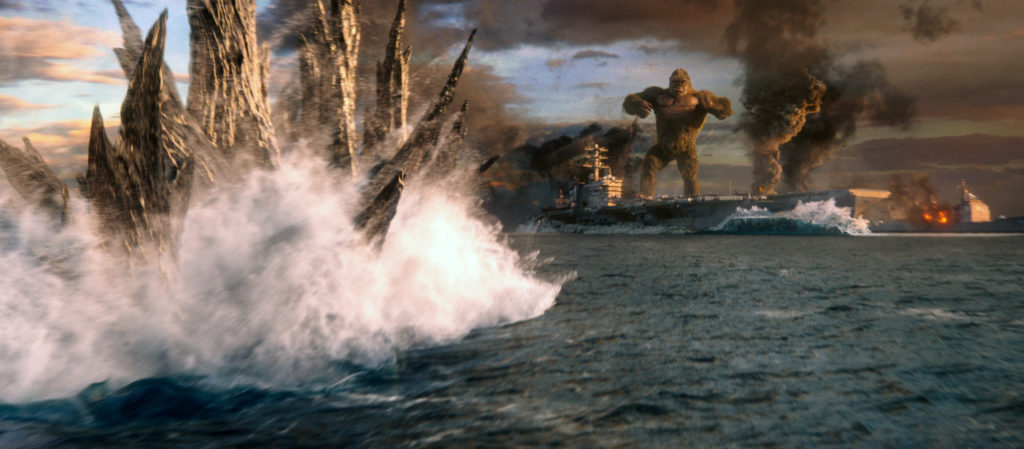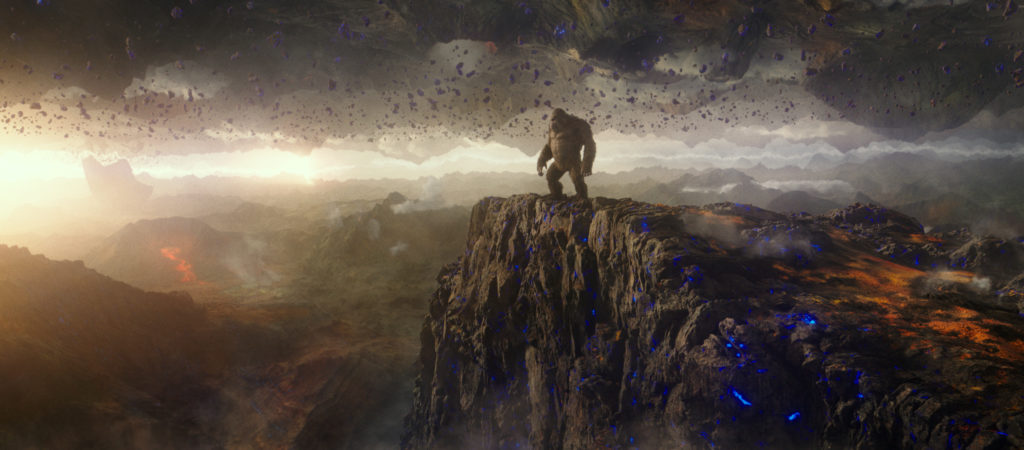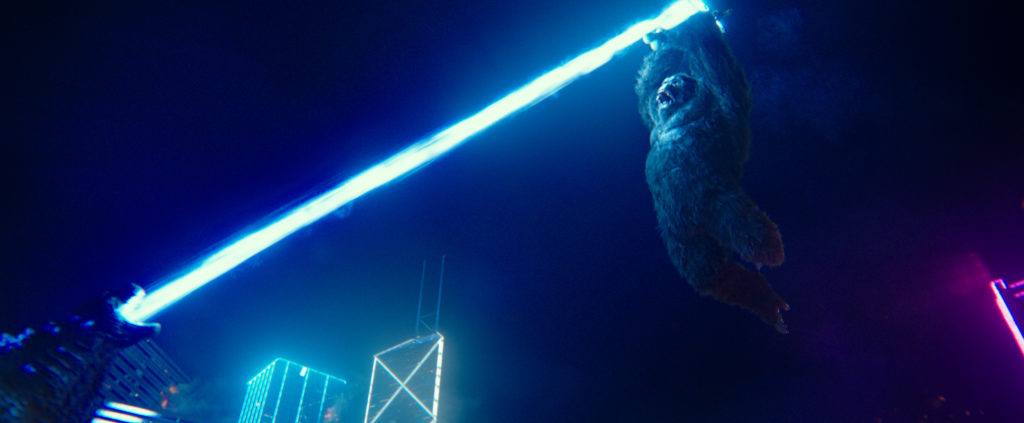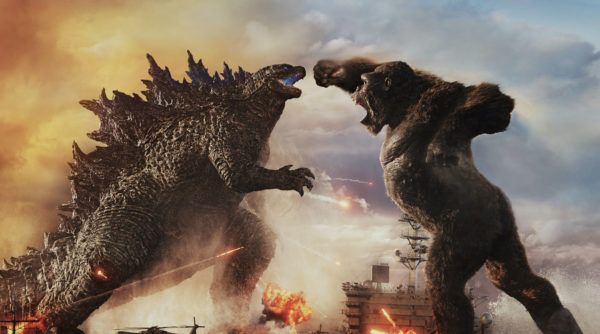If there’s a genre that deserves the full cinematic experience, it’s “giant monsters beat the crap out of each other.” Luckily, moviegoers in North America will have just that opportunity on March 31, when director Adam Wingard’s Godzilla vs. Kong debuts in theaters . (And, simultaneously, on HBO Max.)
International viewers have already put their stamp of approval on the film, which surpassed Tenet to be the top opener of the pandemic period. It’s a fair bet that, for many, Godzilla vs. Kong will represent that first trip back to the movies since the onset of Covid-19—and a fun, spectacle-laden blockbuster where two titans of the silver screen duke it out for just under two hours is a perfect fit for just that sort of excursion. Below, Wingard (The Guest, You’re Next) speaks exclusively to Boxoffice Pro about making a fun, monster-packed epic—and the experience of watching his own film on Imax.
I want to thank you—first off, because I really enjoyed the film. But more specifically than that, thank you for directing a film that is not two hours and 20 minutes long.
Well, thank you. It’s funny you mention that, because some of the hardcore Godzilla fans are mad at me because the movie’s not three hours, and because they just want more and more. I always have to explain to them: “Listen, if this movie had an extra hour, it’s not going to be more monsters fighting. It’s going to be boring scenes of people talking about monsters.” What we tried to do is make it as dense an experience as possible.
No one tunes in to watch the human parts of a Godzilla movie.
Exactly. So why give them more?
This movie felt really ’90s to me, in a weird way. And I think one of the elements of that is that it doesn’t have that bloat that a lot of the modern Hollywood spectacle films do. There’s very little fat on it.
You can look back at my other films. I’m a director that’s sort of obsessed with efficiency and pacing. I’ve never made a movie over two hours. This is my longest film to date, and it’s still under two hours. So it’s kind of funny that that’s a thing, but it’s something I’m very conscious of. I think that if you’re going to go over two hours, the movie has to be Lawrence of Arabia or something like that. You can’t just arbitrarily do it. A lot of times movies go over two hours because people fall in love with the wrong things, or they just get lazy. And it really boils down to that. Maybe sometimes my movies move too fast for people, but I like that. I like that we’re creating a real dense piece of entertainment for people.
And you don’t get bored watching it. You don’t feel condescended to; “Okay, I get what you’re trying to tell me, let’s move on.”
These movies are for kids, too, you know? I remember very specifically being bored in a lot of movies as a kid. Even some of my favorite movies, they would have these moments where you’re just bored. For me, I tried to consider that ADD vibe a little bit and tried to make sure that we’re catering to it just a little bit.
We have a challenge with a film like this. I’m trying to make an efficient, densely entertaining movie, but we’re also making a sequel to a preexisting franchise. But it also needs to feel like a standalone movie at the same time. And so I always knew that the first half hour is going to be a big setup period for us, that we had to lay in a lot of exposition, we have to set up the characters and try to do it as quickly as possible while still sucking you in. So it was always important to me that, despite all those odds against us, that the monsters are never too far. They may not be battling all the time— you’re still gonna get to see them blow some stuff up occasionally and all that—but just keeping them in almost every scene. They’re always right there. They’re always just off to the side. We never move too far away from them. Because that’s when these movies get in trouble, is when you feel like you’re just waiting for the monsters to show up again. But this movie, once it hits the half hour mark, it’s pretty relentless. I’ve never done anything like this, even with my obsession with pacing and all that kind of stuff. This movie just takes off, and it’s pretty much nonstop action.

I love the Showa Godzilla movies. But even in those those older ones, when the human characters come on, that’s when you check your phone, that’s when you go to the bathroom. The script comes to you, I guess, mostly done. How do you make the human characters in a Godzilla movie interesting?
This one actually didn’t have a script when I came on. There was a little three- to five-page proposal outline that Terry Rossio and a writers room had created. So we knew the big set pieces, the general idea of them, where the movie was going, the structure of it, and who most of the characters were. But then I was able to work with him in terms of developing it into the script, so I was able to get in right at the beginning. At the end of the day, you have to shoot a lot of extra stuff to figure out how to whittle it down. I’m sure we overcompensated initially, trying to make sure that we dotted every i and crossed every t when it came to where the characters start and where they end. And I have to be honest, a lot of it just ends up getting cut, because of what you’re alluding to. You watch the film and you’re just like, “It doesn’t really matter.” The characters need to take us from one place to the next, and they’re always associated with the monsters. But at the end of the day, the efficiency of that is the most important. Because Godzilla and King Kong, they’re not just monsters. They’re characters in the film, too, you know? That’s what people are coming to see, that’s going to be the main event, and that’s where I tried to focus us as much as I possibly could.
If it’s just two people fighting each other—that’s an issue I have in some modern action movies, not not to name names. But it’s just constant. And it gets it gets dull after a while.
You become desensitized to it a little.
With King Kong, I feel his sadness and his want for a family. And Godzilla always kind of whips me up into a primordial rage.
To me, that was what the real goal was, was trying to really set up Kong as the heart of the movie. He’s definitely an underdog from the get go. Godzilla, in this film, he gets to be the heel of the movie. He’s the WWE villain, he’s the Undertaker. And so that’s really fun to play off of. But I felt like we needed to get people in that headspace, so that when they start fighting, you’re just having a blast, and you know what the stakes are with them.

And the first scene does that so well, setting up that Kong is trapped and alone.
We had one test screening before the pandemic hit. And in that test screening, I invited Robert Kirkman, who does ‘The Walking Dead.’ He and I are friends. And he was sitting right next to me during the test screening. And right before the movie started rolling, the room went black. And he’s a funny guy, he’s got a very funny sense of humor, very dry. He leaned over to me and was like: “So how long do we have to wait for the monsters to show up?” And the second shot of the movie is of King Kong, and he just started laughing his ass off when he saw that.
That was really important to me, that the movie’s kind of saying: “Listen, you’re in safe hands here. What you came to see is what we’re gonna deliver.” It’s not always just about seeing the monsters fighting. You can watch the monsters do literally anything and it’s really amazing and engaging. So just watching Kong go through his morning routine, scratching his butt, taking a shower in a waterfall—that in itself is, to me, really super engaging. I could watch him do just about anything and it’s really cool. I mean, one of the best scenes in Skull Island, probably the best scene, is Kong eating that octopus or squid or whatever, because it’s just really interesting to see on that big scale.
Or in something like Shin Godzilla, seeing the way Godzilla evolves and how that adds onto the Godzilla mythology.
That’s a great movie. You know, it’s funny that Shin Godzilla hasn’t really come up at all in any of the interviews that I’ve done. Maybe just very quickly, in passing, but the conversations always end up going to the other films. But the big inspiration I got from Shin Godzilla—other than the fact that that’s just one of the best Godzilla films of all time—is I love the way that they showed Godzilla’s nuclear breath in that film. That laser thing that he’s doing with that kind of pinkish hue to it. But the way they depicted that. So I actually took a lot of inspiration from the way that they used the atomic breath in that film, to the way that Godzilla uses it in my movie.

I love Shin Godzilla. When you’re working on a Godzilla film, are you involved with Toho? Are you in communication with them? Because I know they’re super protective. Godzilla is their baby.
Yeah, they’re very protective. I mean, they have certain things that you can and can’t do emotionally with Godzilla, obviously. They have a guy there that—I think this is the title, it’s Chief Godzilla Officer or something. And he has a business card and everything. He’s a really nice guy, really funny. All the Toho guys are super, super cool. We went and had dinner with them during the shoot. They came in and visited. And I’ll never forget—I was very nervous, actually, for Toho to show up, because obviously I have a lot of respect for where they’re coming from, and they’re the gatekeepers of Godzilla and always have been.
They hadn’t seen anything from the movie, and they came to Australia to visit. The editors put together a little sizzle reel of about, I don’t remember, it was maybe three to five minutes, probably about five minutes actually worth of footage. And they cut together all of our coolest footage with some of the previz, just to give them an idea of how things were going at that point. And I remember the Toho guys were in the office doing that. I was shooting a scene. And then at a certain point, I finished shooting the scenes, and I came out and the Toho guys were all standing next to [Godzilla vs. Kong producer] Alex Garcia. They kind of waved me over, and they introduced me and everything. And I’ll never forget, one of the heads of the company, he was standing there and somebody was translating for him for us. They said, “Oh, he just watched the sizzle reel.” And then he interrupted and said in English: “We have satisfaction.” And it was such a great moment. Relief, too. But I was just so excited. And he said it with a sense of humor, which was really funny. He was very real and authentic in his enthusiasm. So it was it great moment for me, making a Godzilla movie.
Sadly, I had to watch a screener on my TV. I have my Imax tickets, they’re purchased. Have you been able to see it on a big screen? I really hope people do, because this is a great film for it. [Godzilla vs. Kong has delivered the biggest opening weekend for a film on Imax since December 2019.]
Oh, absolutely. I was fortunate to be able to have an Imax to myself for two days straight. I went down to their headquarters, and they have a gigantic screen there. Basically, I had to watch back all the different Imax versions. So the first day, I watched both 2D versions of the movie, because there’s different sized Imax screens—there’s the slightly smaller IMAX screen and then the gigantic one. And so my day would begin. I would go to the first Imax screening, and then the next one. And then the next day I went in and it was the both of the 3D versions. And it was one of the best experiences for me as a filmmaker, ever, just having an entire theater to myself. There’s even an operator behind me, so if I wanted to pause it, I could pause it at any point. Which I never did. I like to be able to go through it. But it was just so cool.
I remember when I got there—you’re in this theater, and the screen is so big. And so your natural inclination is, I’m going to go to the back of the room. And I remember asking them, kind of jokingly, “Well, where does Christopher Nolan sit when he’s in here?” And they’re like, “Well, he sits down at the third row.” And I thought “Good Lord, he sits at the third row?” I started watching the movie, and it got right up to the ocean battle scene, and I thought: “You know what? I’m going to go down there. I’m gonna get a face full of this thing.” I didn’t move to the third row. I think I sat in the fifth row. And I feel like that’s the sweet spot for me, the fifth row in Imax. You would think it would be too much. You would think you would miss things. But the fifth row is perfect. Your periphery, it’s like you’re just in the movie. And even the 3D version worked in the fifth row. So that’s my big recommendation.



Share this post